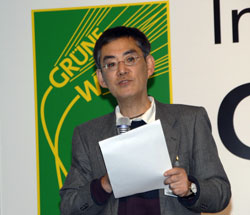 The disaster in Japan due to the earthquake and tsunami is terrible, especially in terms of the loss of human life. Our hearts and prayers go out to the people who have lost their life or loved ones. Cindy and I had the opportunity to visit Japan when the International Federation of Agricultural Journalists held its annual Congress there in 2007. We not only stayed in the affected area but developed relationships with a number of the agricultural journalists who were participating in the event. One of the coordinators was Masaru Yamada, pictured below. I contacted Masaru yesterday to see if we could talk about how the disaster has affected agriculture and we had a nice discussion via Skype that I’m sharing with you in this week’s program. I’m happy to report that Masaru says he and his family are doing fine.
The disaster in Japan due to the earthquake and tsunami is terrible, especially in terms of the loss of human life. Our hearts and prayers go out to the people who have lost their life or loved ones. Cindy and I had the opportunity to visit Japan when the International Federation of Agricultural Journalists held its annual Congress there in 2007. We not only stayed in the affected area but developed relationships with a number of the agricultural journalists who were participating in the event. One of the coordinators was Masaru Yamada, pictured below. I contacted Masaru yesterday to see if we could talk about how the disaster has affected agriculture and we had a nice discussion via Skype that I’m sharing with you in this week’s program. I’m happy to report that Masaru says he and his family are doing fine.
 According to Masaru the amount of farm land impacted is less than one percent of the total farmland in Japan. Most of this area was being used for rice and fruit and vegetable production. He says that in some ways the worst of the situation has passed such as affected transportation. However, he fears that in other ways the worst is yet to come for Japanese agriculture. The worst may be how the rest of the world reacts to fears about radiation contamination of food stuffs and he’s hoping that accurate information will be published by journalists the world over. Right now there is a lack of information about how agricultural products and farm land are affected because of the immediate need to devote resources to the disaster itself. He says that there are estimates that more people are missing and feared dead than have already been confirmed. I find that just hard to comprehend. And then there’s the problem with the nuclear power plants themselves.
According to Masaru the amount of farm land impacted is less than one percent of the total farmland in Japan. Most of this area was being used for rice and fruit and vegetable production. He says that in some ways the worst of the situation has passed such as affected transportation. However, he fears that in other ways the worst is yet to come for Japanese agriculture. The worst may be how the rest of the world reacts to fears about radiation contamination of food stuffs and he’s hoping that accurate information will be published by journalists the world over. Right now there is a lack of information about how agricultural products and farm land are affected because of the immediate need to devote resources to the disaster itself. He says that there are estimates that more people are missing and feared dead than have already been confirmed. I find that just hard to comprehend. And then there’s the problem with the nuclear power plants themselves.
This is a situation that’s going to take some time to resolve. In the meantime Masaru says that one way agricultural journalists can provide assistance is to make sure they are reporting good, factual information. I agree with that. We’ve already seen a high level of hysteria in some non-farm reporting about radiation. The upsurge in sales of radiation treatment medication is a good example of the impact this type of reporting can have. Just do a Google News search for it! It’s an example of how sensationalist news reporting can create a manufactured crisis. That’s not to in any way suggest that the situation in Japan with the power plants is not serious by the way. Let’s just use some common sense folks!
As I noted yesterday, IFAJ is coordinating an assistance effort for agricultural journalists in Japan. Here in the U.S. the place to contact if you’d like to help is the American Agricultural Editors Association. If Masaru’s fears become reality one of the biggest problems Japanese ag journalists may face is a lack of work. Of course in the mean time they also have health and safety concerns if they’re going to cover a situation that has a danger due to the situation with the potential radiation contamination.
Learn more about how the disaster in Japan has affected the country and its agricultural industry in this week’s program: ZimmCast 297 - Affects of Japan Disaster
Thanks to our ZimmCast sponsor, Growmark, locally owned, globally strong, for their support.
The ZimmCast is the official weekly podcast of AgWired. Subscribe so you can listen when and where you want. Just go to our Subscribe page

